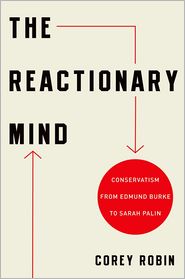 He applied the “Page 99 Test” to his new book, The Reactionary Mind: Conservatism from Edmund Burke to Sarah Palin, and reported the following:
He applied the “Page 99 Test” to his new book, The Reactionary Mind: Conservatism from Edmund Burke to Sarah Palin, and reported the following:Page 99 of The Reactionary Mind takes up a major theme of the book – how a quintessentially elitist politics like conservatism manages to present itself as the voice of the people – through a discussion of Edmund Burke’s Reflections on the Revolution in France. Specifically, I look at Burke’s account of the abduction by a revolutionary mob of Marie Antoinette and the royal family from the palace at Versailles.Learn more about The Reactionary Mind at the Oxford University Press website.
I like this page for a few reasons. First, it gives you a sense of Burke’s prose. I’ve often thought that one reason conservative thought is so fun to read is that some of its major exponents—Burke, Michael Oakeshott, Carl Schmitt—are such mesmerizing stylists. Perhaps that is also one of the sources of its appeal?
Second, the page shows that far from being a recent innovation of American conservatism—which is how many journalists and scholars view it—populism was present on the right at the very beginning. In depicting Marie Antoinette as a victim, Burke manages to do for the aristocrat what Rousseau did for the commoner: make her an object of popular compassion, someone with whom we can identify, no matter how low our station. Since Burke, virtually every conservative has been searching for that magic elixir, whereby a figure of great wealth and status (paging George W. Bush) becomes an Everyman.
Most important, the page demonstrates just how distinctively modern conservatism is. While Burke offers Marie Antoinette as an archetype of classical tragedy, I point out that in tragedy “the most any hero can hope for is to understand his fate: the wheel of time cannot be reversed; suffering cannot be done.” Yet Burke clearly wants to undo the fate of the royal family (at the time of his writing, they had not been executed) and indeed of the French Revolution as a whole. His is not a stoic appraisal of historical irreversibility but a radical and revanchist call to arms, an exhortation to repeal the verdict of time. Once again demonstrating that the radicalism and revanchism of the contemporary American right is anything but novel.
--Marshal Zeringue



